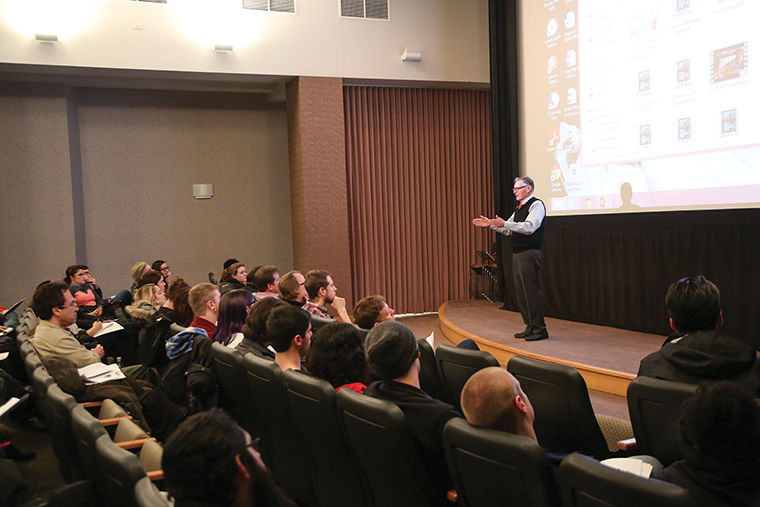Entertainment attorney talks film, fair use
Entertainment attorney talks film, fair use
February 16, 2015
The subject of fair use and how filmmakers can make use of copyrighted material took center stage on Feb. 10 at Film Row Cinema in the 1104 S. Wabash Ave. Building.
Michael Donaldson, an acclaimed entertainment lawyer based in Los Angeles, spoke to members of the campus community. The event was hosted by the college and the Independent Filmmakers Project Chicago, a nonprofit that advocates for independent filmmakers and their work.
Donaldson has provided legal and clearance counsel on blockbuster hits such as the critically acclaimed “Boyhood,” “This Film is Not Yet Rated” and “Blackfish.”
Donaldson, owner of Donaldson + Califf and author of “Clearance and Copyright: Everything You Need to Know for Film and Television,” visited Columbia to teach professional and aspiring filmmakers about fair use—the legal test that allows filmmakers and other creators to use copyrighted material without permission of the license holder to better demonstrate their ideas.
The event was organized by IFP/Chicago after Donaldson told the organization he wanted to hold a talk on fair use, according to Julie Mynatt, an adjunct in the Cinema Art + Science Department and managing director at IFP/Chicago.
“My mission is to help filmmakers tell their story better,” Donaldson said. “[Fair use] allows filmmakers and storytellers of all kinds to tell their story their way. People who own copyrights shouldn’t be able to tell you that you can’t tell your story because [they] own the copyright or the trademark.”
During his presentation, Donaldson said there are three main points to consider in excerpting a copyrighted work for use in a documentary: How well does this item illustrate your point? Are you only using what you need to make your point? Is the connection between the except and the point you are trying to make obvious to the viewer?
Mynatt said IFP/Chicago was already interested in holding a session on fair use, and Donaldson was the perfect fit to visit the college.
“He literally wrote the book [on fair use],” Mynatt said. “He’s engaging, well-established [and] well-informed. He’s also worked across the industry with a variety of filmmakers, so he understands the breadth and depth of the filmmaking process and he’s able to apply this wealth of knowledge that he has.”
During his presentation, Donaldson shared the story of Yoko Ono’s attempt to sue the team behind “Expelled,” a documentary he provided legal counsel for, when the creators used part of John Lennon’s “Imagine” in their film.
“We have a rule in our office that if something is dicey, everyone has to agree [on it],” Donaldson said. “We consider being sued by Yoko Ono as dicey.”
The audience roared at his quip. Donaldson continued, adding that Ono’s injunction request was denied by the judge.
“[The denial] said, ‘Plaintiff has not shown a substantial likelihood of success—or even a slim likelihood of success,’” Donaldson said. “That was great.”
Donaldson also discussed in the session how fair use applies to fictional films, which he said is a fairly recent phenomenon.
“As recently as 10 years ago, people were saying, ‘Documentaries can use fair use but there is no fair use for fiction films,’” Donaldson said. “It’s not true.”
Donaldson added that it is important for filmmakers to understand fair use in relation to fictional films because they have a right to incorporate copyrighted material to tell a truthful story, and the laws allow them to do that.
Andrew Bramson, a freshman cinema art + science major, said he attended Donaldson’s presentation because he wanted to become more educated on the legal aspects of filmmaking.
“I’ve always been a little bit confused as to the different ways you can release [films] and the rights behind it,” Bramson said.
Bramson said he learned a lot about fair use and found Donaldson’s expertise impressive.
“If you create something, you should have rights to it and control over what you create,” Bramson said.
Mynatt said this information is helpful not only for professional filmmakers, but also for students who are trying to break into the film industry.
“It’s one of those things that is important for everybody to get a lay of the land and understand what it is, why these rules and guidelines exist, how it can protect you, but also how it can help you as a creator and as an artist,” Mynatt said.








